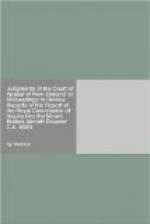Natural Justice
This Court has had to examine and apply the principles concerning natural justice and fairness quite often in recent years. In translating the ideals of natural justice and fairness into current operation in New Zealand we have been influenced as to general principles mainly by decisions of the Privy Council and the House of Lords but, of course, we have had New Zealand conditions and practicalities very much in mind. The result has been a pragmatic approach.
Some overseas Courts have held that if all that occurs is inquiry and report and the report is not in law a condition precedent to some further step the rules of natural justice are automatically excluded. That was the premise, for instance, of the High Court of Australia in Testro Bros. Pty. Ltd. v. Tait (1963) 109 C.L.R. 353. A contrary approach is to be found in the judgement of Schroeder J.A. representing the view of the majority of the Ontario Court of Appeal in Re Ontario Crime Commission (1962) 133 C.C.C. 116, although that case depends partly on Ontario statute law. There is little attraction in the idea of automatic exclusion. Commissions of Inquiry have compulsory statutory powers of insisting on evidence and their findings can affect rights in the ways already outlined. It seems to us highly unlikely that the New Zealand Parliament intended them to be wholly free of the elementary obligation to give persons whom they have in mind condemning a fair opportunity for correcting or contradicting any relevant allegation.
Some reinforcement for the view that they are under that obligation is to be found in some added considerations. Section 4A of the Commissions of Inquiry Act, enacted in 1980 in place of briefer provisions and in time for the Erebus inquiry, provides:
“4A. Persons entitled to be heard—(1) Any person shall, if he is party to the inquiry or satisfies the Commission that he has an interest in the inquiry apart from any interest in common with the public, be entitled to appear and be heard at the inquiry.
(2) Any person who satisfies the Commission that any evidence given before it may adversely affect his interests shall be given an opportunity during the inquiry to be heard in respect of the matter to which the evidence relates.
(3) Every person entitled,
or given an opportunity, to be heard
under this section may
appear in person or by his counsel or
agent.”
The section may be seen as a recognition by Parliament that natural justice should apply. It does not purport to enact a complete code of procedure or to cover the whole field of natural justice, which would not be easy in a statute of this general kind. The statute specifically requires an opportunity to be heard to be given to any person who shows that evidence may adversely affect his interests. In




